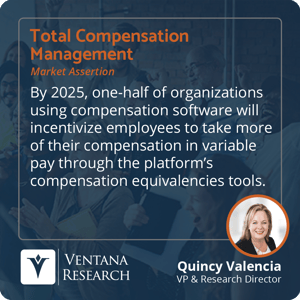A lot has changed in business over the past ten years. The rise of e-commerce and omnichannel buying and engagement, the increasing digitization of the economy and the broader adoption of pricing and revenue models such as subscription and usage. And these are all having an impact on how business leaders need to think about their organizations.
One of the more significant changes has been an increase in the number of an organization’s employees now more directly tied to revenue. With a traditionally sales-led organization, there has been a singular focus on new customer acquisition, with sales teams seen as the tip of the spear and the drivers of revenue growth. But, with the rise of subscription and usage pricing and revenue models, this is changing to increasingly recognize the equal importance of account retention and the need for an expansion of business within existing customers.
A direct consequence of this shift is that the number of roles with a direct linkage to revenue has increased substantially. Customer Success teams, for example, hold responsibility for the overall success of a customer relationship. This attention to service and support directly impacts the ability to secure renewals or for an account manager to upsell or cross-sell within the business. Organizations are now recognizing this pivotal role in the form of shared commissions and team bonuses, where bonuses based on total organizational financial performance were once the only standard. This is having an impact on how organizations and HR and finance think about compensation. Unlike most employees, sales teams’ compensation includes a large variable element that is linked to sales transactions. And although there are numerous variations, this compensation based on transactions is very different from most of an organization’s employees, where the variable element is proportionally much smaller and is linked to either personal achievements, such as MBOs, or shared targets, such as corporate revenue growth.
The pandemic era also finally turned some in the Office of Finance into believers in the very real concept of Cost of Vacancy, where the lack of workers to serve customers translated into shuttered locations and a complete loss of revenue when people elected not to return to the workforce, even when restrictions lifted. Further, the burnout associated with prolonged hours and increased workload led to regrettable attrition and found companies unable to refill those vacated positions, continuing the cycle. In response, many organizations quickly implemented new (or new to them) incentive pay programs, including temporary hourly rate increases, hazard pay, shift differentials, manager bonuses tied to retention rates, extended referral bonuses where one-time payouts were once the norm, spot bonuses, bonus targets for all location employees based on target sales bands — the list is exhaustive, and all require a compensation management platform agile enough to allow the creation and calculation of a variety of compensation schemes, quickly.
Our research reveals that organizations have seen tangible results associated with these types of variable incentives in terms of improved retention and employee engagement, which have been tied repeatedly to positive  business outcomes. So much so that we assert that by 2025, one-half of organizations using compensation management software will incentivize employees to take more of their compensation in variable pay through the platform’s compensation equivalencies tools.
business outcomes. So much so that we assert that by 2025, one-half of organizations using compensation management software will incentivize employees to take more of their compensation in variable pay through the platform’s compensation equivalencies tools.
So, as more employees are directly tied to revenue, it follows that more of them will have incentive compensation plans that more closely resemble those of salespeople. This will require more planning and involvement in plan design across teams and will potentially tax an organization’s ability to administer an accurate and timely payout system. Providers of specialist incentive compensation applications have both the technology and the expertise to help HR, finance and IT organizations with both plan design as well as systems to manage crediting and payout. These systems also support plan approval processes as well as commission calculation dispute resolution. And many have embedded analytics to track actual vs. intended outcomes as well as links to opportunity-level forecasts to understand potential future liability of commissions to be paid out. Attempting to do this in a typical HR compensation planning system, or utilizing spreadsheets, will find that this doesn’t scale and leads both to contentious errors as well as not achieving intended outcomes. In fact, we assert that through 2025, fewer than 1 in 5 companies will develop incentive compensation plans that cover all revenue supporting teams, impacting an organization’s ability to hit new, expansion and retention revenue targets, despite the very real lessons that should have been learned during economic upheaval of the most recent several years.
For many organizations, transactional incentive compensation can represent over 10% of total employee expenses, so ensuring both plan design and effective execution and administration is more than just a nice to have.  For organizations that either are seeing growth in, or are planning to broaden, the number of staff who are directly linked to revenue, variable compensation, similar to traditional sales, will become more prevalent. We recommend that HR review their existing compensation management systems and processes and, where this is not something that is supported, evaluate new compensation software platforms, like those included in our 2023 Total Compensation Management Value Index. And for those using a sales incentive compensation management (ICM) application, engage with that vendor as to whether it supports the needs of a broader group of staff. In addition, also look to ICM vendors for help with best practices; as well review, the existing incentive compensation plans to ensure they are not negatively impacting a shift to omnichannel engagement.
For organizations that either are seeing growth in, or are planning to broaden, the number of staff who are directly linked to revenue, variable compensation, similar to traditional sales, will become more prevalent. We recommend that HR review their existing compensation management systems and processes and, where this is not something that is supported, evaluate new compensation software platforms, like those included in our 2023 Total Compensation Management Value Index. And for those using a sales incentive compensation management (ICM) application, engage with that vendor as to whether it supports the needs of a broader group of staff. In addition, also look to ICM vendors for help with best practices; as well review, the existing incentive compensation plans to ensure they are not negatively impacting a shift to omnichannel engagement.
Regards,
Stephen Hurrell & Quincy Valencia


 business outcomes. So much so that we assert that by 2025, one-half of organizations using compensation management software will incentivize employees to take more of their compensation in variable pay through the platform’s compensation equivalencies tools.
business outcomes. So much so that we assert that by 2025, one-half of organizations using compensation management software will incentivize employees to take more of their compensation in variable pay through the platform’s compensation equivalencies tools. For organizations that either are seeing growth in, or are planning to broaden, the number of staff who are directly linked to revenue, variable compensation, similar to traditional sales, will become more prevalent. We recommend that HR review their existing compensation management systems and processes and, where this is not something that is supported, evaluate new compensation software platforms, like those included in our 2023 Total Compensation Management Value Index. And for those using a sales incentive compensation management (ICM) application, engage with that vendor as to whether it supports the needs of a broader group of staff. In addition, also look to ICM vendors for help with best practices; as well review, the existing incentive compensation plans to ensure they are not negatively impacting a shift to omnichannel engagement.
For organizations that either are seeing growth in, or are planning to broaden, the number of staff who are directly linked to revenue, variable compensation, similar to traditional sales, will become more prevalent. We recommend that HR review their existing compensation management systems and processes and, where this is not something that is supported, evaluate new compensation software platforms, like those included in our 2023 Total Compensation Management Value Index. And for those using a sales incentive compensation management (ICM) application, engage with that vendor as to whether it supports the needs of a broader group of staff. In addition, also look to ICM vendors for help with best practices; as well review, the existing incentive compensation plans to ensure they are not negatively impacting a shift to omnichannel engagement.








